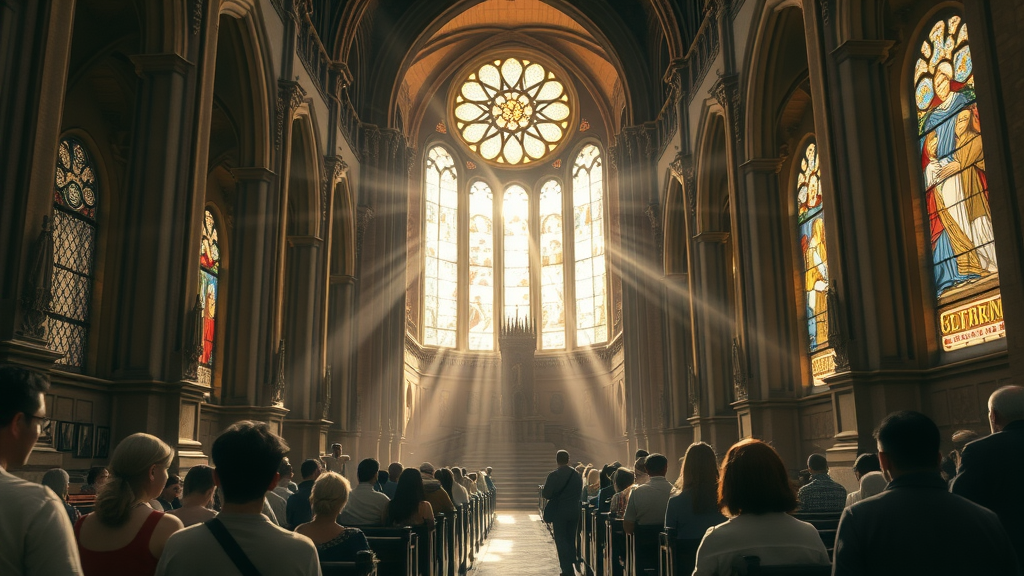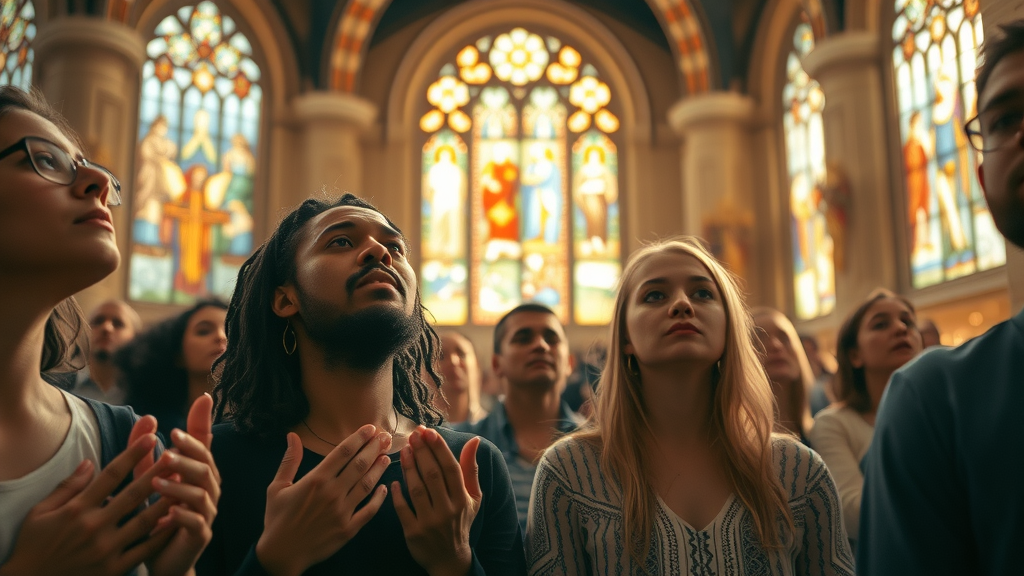"Have you ever wondered if there’s more to Christianity than what meets the eye?"

Have you ever paused and thought: Is there more to faith than what we see with our eyes? For centuries, Christianity has been portrayed as either routine rituals or traditional teachings. But what if there’s another dimension—a supernatural reality—that waits to be unveiled and fully experienced? Today, more believers are discovering the profound, often mysterious side of the Christian faith, known as supernatural Christianity . This is a powerful journey that transforms a religion of routines into a relationship ignited by miracles, personal encounters with the Holy Spirit , and a stirring that redefines what it means to trust in Jesus Christ .
This article takes you beneath the surface of conventional beliefs to reveal how supernatural Christianity changes lives, challenges traditions, and brings ancient faith into the vibrant, unpredictable reality of the modern world. Whether you’re skeptical, curious, or eager for more, you’ll find answers, stories, and practical insights that may reshape your understanding of God’s power in our day.
Exploring the Reality of Supernatural Christianity
- Why the concept of supernatural Christianity fuels curiosity and debate in contemporary faith circles
- Confronting the tension between traditional doctrine and modern expressions of the supernatural
The concept of supernatural Christianity sparks intense curiosity and lively debates within modern faith communities. On one side, believers find hope and evidence in stories by Christian writers to encourage faith—tales of the supernatural power of God , miraculous healings, and encounters that transcend the natural world . On the other hand, some view these accounts with suspicion, wondering if reported supernatural experiences fit within traditional doctrine or if they blur the line between spiritual encounter and wishful thinking. This clash of perspectives can be seen everywhere from church pulpits to popular podcasts, as questions about the supernatural aspect of faith become more common in our fast-paced era.
At its core, supernatural Christianity challenges us to look beyond what’s visible, urging us to consider the movement of the Holy Spirit as an everyday reality rather than a tale confined to ancient texts. This challenge brings an exciting, sometimes unsettling tension: Can long-held beliefs about the created universe, the spiritual realm , and divine intervention coexist with contemporary expressions like prophecy, healing, or deliverance? By confronting these questions head-on, we find ourselves at the heart of a conversation that has the power to redefine how we live and witness our faith in the 21st century.
Personal Reflections: Embracing Supernatural Christianity in Everyday Life
Embracing supernatural Christianity goes far beyond fantastic stories or dramatic church services—it's about experiencing the movement of God in daily life. For many, the idea of the supernatural brings a good fear or awe, recognizing that the power of God is not abstract, but active and close. This shift from a distant to a present God has transformed countless lives, infusing mundane routines with a sense of divine purpose and expectation. Stories by Christian writers, both ancient and modern, point to believers who have encountered miracles—sometimes subtle, sometimes spectacular—at moments of greatest need.
When people open themselves to the activity of the Holy Spirit , a world of extraordinary events becomes accessible. Whether it's healing from illness, finding peace in hopelessness, or receiving wisdom during crisis, supernatural Christianity offers hope that the natural world is not all there is. The faith renewed in these moments testifies that the created universe is charged with the possibility of divine interaction, affirming that the end of this age may simply mark a new beginning for those who dare to believe.
Case Christianity: Stories of Transformation and Encounters
- Real-life miracles attributed to the Holy Spirit
- Testimonies of faith renewed through supernatural experiences
Case Christianity is built on powerful stories of transformation—real events where the supernatural invades the natural realm . Consider testimonies of people who report miraculous healing after prayer, or moments when prophecy gave direction at a crucial crossroads. These cases aren’t limited to history books. Modern Christian writers to encourage others frequently document divine intervention: from financial breakthroughs that defy statistics, to freedom from addiction and oppression in a single moment. When believers encounter the supernatural power of God, these stories become evidence, inspiring others to seek more than natural experiences alone.
While skeptics label such events as mere coincidence, those who experience the supernatural describe a deep shift in their worldview. What was once a crime scene of discouragement transforms into a place of hope because the spirit of God is at work. Through testimonies, believers see how the natural world and supernatural life overlap—fueling faith that God moving in our lives isn’t a rare exception but a pattern waiting to be recognized.

The Historical and Biblical Foundations of Supernatural Christianity
Supernatural Christianity isn't a 21st-century invention—it is deeply rooted in the Bible and church history. Throughout scripture, we see repeated demonstrations of God’s supernatural power, from Old Testament prophets in II Kings calling down fire or parting waters, to New Testament accounts of signs and wonders performed by Jesus Christ and his followers. These extraordinary events serve as anchors that affirm God’s willingness to defy the force of gravity and the laws of the natural realm for the sake of his people.
The Holy Spirit’s role emerges vividly in the book of Acts, where the early church witnessed Pentecostal fire, miraculous healings, and bold testimonies—all proofs of a living God moving with power. For Eastern Orthodox, Catholic, and Protestant traditions alike, these accounts reinforce the belief that the spiritual realm is active and that the created universe pulses with supernatural energy. By revisiting these foundations, believers today find confidence that their own supernatural experiences connect them to a faith story stretching across centuries.
What Does the Bible Say About Supernatural Christianity?
| Scripture Reference | Supernatural Event | The Holy Spirit's Role |
|---|---|---|
| Acts 2 | Pentecostal Fire | Empowerment of Believers |
| John 14:12 | Greater Works | Promise of Miraculous Signs |
| Mark 16:17-18 | Signs Accompanying Believers | Gift Distribution |
These scriptural references show that supernatural Christianity stands on a firm biblical foundation. The Bible links the movement of the Holy Spirit to events that redefine what’s possible—healings, deliverance, and divine wisdom. It calls believers to expect God to move daily, equipping the faithful with gifts necessary for ministry and spiritual growth, even at the end of this age.

Holy Spirit and Miracles: The Heartbeat of Supernatural Christianity
"The Holy Spirit is not a dormant force, but the active pulse of supernatural Christianity."
At the core of supernatural Christianity is the dynamic presence of the Holy Spirit . Rather than being an abstract idea, the Holy Spirit is viewed as an active participant in believers’ lives—a source of supernatural life, wisdom, power, and comfort. Christians who embrace the supernatural aspect of faith often report that partnering with the Holy Spirit unlocks a wide range of spiritual manifestations, from healing physical illness to breaking longstanding emotional or spiritual chains.
Miracles and spiritual gifts are not reserved for select individuals but are accessible to all who cultivate a relationship with God’s spirit. The ripple effects of these miracles not only impact individuals, but also spread into families, communities, and even broader society. Faith in supernatural Christianity means trusting that the spiritual realm can break into the natural realm, changing the trajectory of lives and rewriting the crime scene of hopelessness with hope.
How the Holy Spirit Moves Through Supernatural Christianity
- Healings—physical, emotional, spiritual
- Prophecy and words of knowledge
- Deliverance from addiction and oppression
Healings provide compelling testimony of the Holy Spirit at work, regularly documented in stories by Christian writers to encourage those struggling with illness or brokenness. Testimonies abound where physical ailments vanish, emotional wounds heal, and spiritual oppression lifts—all attributed to the Holy Spirit’s supernatural intervention. Prophecy and words of knowledge—where believers receive insight transcending the natural world—are further signs of God moving through his people in real time. These extraordinary events, often occurring in everyday settings rather than grand stages, remind us that the power of God is not restricted to biblical times but continues to shape destinies today.

Controversies and Critiques: The Case Christianity Debate
Where Skepticism Meets Faith
- Arguments against the validity of supernatural claims in Christianity
- How the church grapples with authenticity versus fabrication
The rise of supernatural Christianity is not without controversy. Skeptics, sometimes both inside and outside the church, challenge the authenticity and validity of supernatural claims. Critics argue that miraculous stories can sometimes mirror a crime scene—where hope is at stake, but outcomes remain ambiguous or contested. Scientific thinkers may dismiss supernatural experiences as emotional responses to stress or wishful thinking, while others fear the manipulation or fabrication of miracles for personal gain or influence.
For churches navigating these waters, the question becomes: How do we discern authentic moves of the Holy Spirit from human-generated hype? This has led to increased emphasis on accountability, testing of spiritual gifts, and rooting supernatural claims in biblical teachings. Through open dialogue and wise stewardship, many communities are discovering how good fear—a reverence for God’s power—can protect against deception while remaining open to true moves of the spirit of God. The debate, though sometimes divisive, keeps the conversation about supernatural Christianity dynamic and honest as we seek both power and purity in faith.
Supernatural Christianity in Popular Media and Culture
Impact of 'Supernatural' and Other Shows on Christian Worldview
- Differentiating theological truths from fictional portrayals
- How pop culture influences public perception of supernatural Christianity
Popular media has dramatically shaped public perceptions of supernatural Christianity. Television shows like “Supernatural” weave tales of angels, demons, and miraculous powers, sometimes echoing biblical themes but often diverging into pure fantasy. While such shows create entertaining narratives, they risk blurring the lines between real faith and fictional drama—prompting confusion about what true Christianity teaches about the spiritual realm and supernatural life. Christians are frequently challenged to separate Hollywood’s imagination from the actual teachings of Jesus Christ and the Bible.
This influence is a double-edged sword: On one hand, interest in supernatural phenomena may encourage spiritual seekers to explore deeper truths; on the other, it can create misconceptions about the nature of faith, God, and the Holy Spirit’s role in everyday life. Christian writers seek to provide a good read that helps discern the difference, offering sound theology and real-life testimonies to anchor believers in truth. The task is to reclaim the narrative, ensuring that supernatural Christianity is not defined by entertainment alone, but by real encounters with the living God.

Practical Ways to Experience Supernatural Christianity
- Cultivating a personal relationship with the Holy Spirit
- Engaging in faith-filled prayer and worship
- Seeking community with like-minded believers
- Aligning with biblical teachings while remaining open to miracles
Supernatural Christianity isn’t reserved for church leaders or spiritual elites—every believer can step into a life marked by the extraordinary. It begins by cultivating a close, daily relationship with the Holy Spirit, the divine helper. Engaging in faith-filled prayer and worship opens hearts to God's movement, breaking the pattern of routine religion and inviting the miraculous into ordinary circumstances. The journey becomes richer in community, surrounded by others who believe in and celebrate God’s supernatural power at work.
Yet balance is crucial. Supernatural Christianity flourishes when rooted in biblical truth. Aligning your expectations with Scripture guards against error while encouraging openness to the wonders God has promised. As Eastern Orthodox and other traditions have shown across centuries, discernment and humility safeguard believers, ensuring the focus remains on Jesus Christ—the true source of all supernatural life. The result is not only an enriched faith, but a vibrant, supernatural experience of God’s presence that transforms every day.

Challenges and Rewards of Embracing Supernatural Christianity
"Supernatural Christianity demands courage—yet it offers a spiritual vibrance that routine religion cannot rival."
Embracing supernatural Christianity isn’t always comfortable or easy—it often requires believers to step out of the natural world’s safety and logic. At times, it means risking reputation, confronting skepticism, or facing personal doubts about what God can or will do. These moments challenge faith to grow beyond the known, allowing the supernatural aspect of Christianity to become a lived reality. Yet, for those who persevere, the rewards are profound: an energized spiritual life, a strong sense of connection to God’s purpose, and the joy of seeing God moving tangibly in everyday circumstances.
Experience shows that supernatural Christianity is not about chasing miracles for their own sake, but about cultivating an intimate relationship with the Holy Spirit and aligning our lives with divine intention. These rewards—peace, purpose, courage—can’t always be measured by the standards of the natural realm, but they bring a spiritual vibrancy that transforms both the individual and their community. Ultimately, supernatural Christianity offers the hope that, even in the darkest moments, God is present and active, shaping destinies and changing lives.
People Also Ask
Is supernatural based on Christianity?
The TV show “Supernatural” pulls from a wide range of myths—including Christian themes—such as angels, demons, and spiritual warfare. However, its stories are largely fictional, and differ significantly from the beliefs and practices found within supernatural Christianity. The series does not represent authentic biblical teaching but borrows imagery for dramatic effect.
What does the Bible say about supernatural?
The Bible is filled with supernatural events, from God parting the Red Sea to Jesus Christ’s resurrection. It consistently affirms the reality of the spiritual realm and supernatural phenomena, teaching that the Holy Spirit empowers believers to experience miracles and divine intervention, even in the natural experiences of daily life.
What is an example of supernatural in Christianity?
An example of the supernatural in Christianity is the event of Pentecost in Acts 2, where the Holy Spirit descended on the disciples with tongues of fire. Today, many believers continue to witness healings, prophecies, and divine intervention—miracles attributed to God’s direct action beyond the natural world.
Is supernatural a good show for Christians?
Opinions about the TV show “Supernatural” vary among Christians. Some may enjoy it as entertainment but recognize it as fiction, not doctrinal truth. Others prefer to avoid it due to its fictionalized spiritual content. It’s important for viewers to discern between artistic storytelling and biblical truth and to seek guidance through prayer and wise counsel.
Key Questions About Supernatural Christianity (FAQs)
- Is supernatural Christianity the same as charismatic Christianity? While they share similarities, not all who believe in supernatural Christianity identify as charismatic. Charismatic Christianity focuses on spiritual gifts, while supernatural Christianity encompasses a broader belief that God’s power can break into everyday life. Both embrace miracles and the movement of the Holy Spirit.
- How do I discern authentic miracles? Authentic miracles align with biblical truth, glorify Jesus Christ, and produce lasting spiritual fruit. Involvement of church leadership, prayer, and scriptural confirmation help believers distinguish genuine supernatural intervention from exaggeration or error.
- Can supernatural experiences coexist with traditional faith practices? Yes! Many church traditions, including Eastern Orthodox and others, have long histories of supernatural occurrences woven into their practice. The key is balance—grounding spiritual experiences in sound doctrine and community discernment.
- Why are some denominations skeptical of supernatural Christianity? Some denominations prioritize rational, orderly worship and fear the risks of deception or emotionalism. Others have not witnessed supernatural events firsthand and question their validity today. Honest dialogue and biblical study help address these concerns.
Summary: Embracing the Depth of Supernatural Christianity
- Supernatural Christianity bridges ancient faith and modern experience
- The Holy Spirit's role remains central and transformative
- Engagement with case Christianity brings both challenges and zeal
- Discernment and wisdom are essential for spiritual growth
Ready to Experience Supernatural Christianity?
Dare to deepen your faith. Embrace the supernatural with courage, wisdom, and expectation—and watch as your everyday life becomes a canvas for God’s miraculous power!
To deepen your understanding of supernatural Christianity, consider exploring the following resources:
-
“A Supernatural Faith” by R.C. Sproul discusses the essential role of the supernatural in Christianity, emphasizing that removing the supernatural elements would strip the faith of its core essence. ( ligonier.org )
-
“Charismatic Christianity” provides an overview of a form of Christianity that emphasizes the work of the Holy Spirit and spiritual gifts as integral to a believer’s daily life. ( en.wikipedia.org )
These resources offer valuable insights into the supernatural aspects of Christianity, enriching your exploration of faith beyond the conventional.
 Add Row
Add Row  Add
Add 


Write A Comment